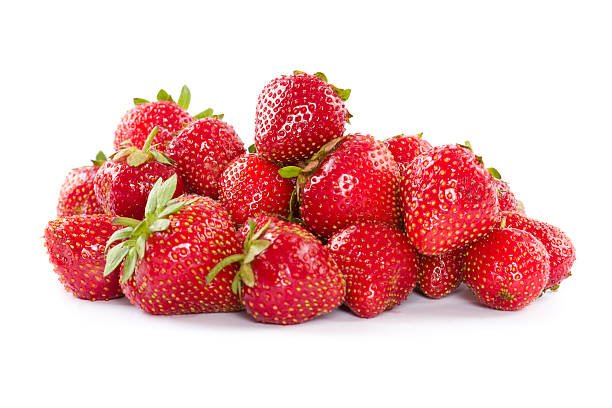Strawberry
The strawberry is a beautifully sweet, aromatic, fiber-rich fruit packed with vitamins, minerals, and antioxidants. Strawberries are one of the most well-liked fruits on the market, with a naturally delicious flavor and lots of nutrition to offer. It’s easy to see why strawberries fit perfectly into a healthy lifestyle.


Strawberry Nutrition Facts
One cup of halved strawberries (152g) includes 49 calories, 1g of protein, 12g of carbohydrates, and 0.5g of fat. Strawberries also are an excellent source of vitamin C, fiber, and potassium. The following nutrition information is provided by the USDA.1
- Calories: 49
- Fat: 0.5g
- Sodium: 1.5mg
- Carbohydrates: 11.7g
- Fiber: 3g
- Sugars: 7.4g
- Protein: 1g
- Vitamin C: 89.4mg
- Potassium: 233mg
- Magnesium: 19,8mg
Carbs
Strawberries have about 12 grams of carbohydrates per cup. This includes 3 grams of fiber and 7.4 grams of sugar. The glycemic index of strawberries is 25, and the glycemic load is 3.2
Fats
Strawberries are naturally very low in fat—half a gram per cup. The majority of these are polyunsaturated fatty acids.
Protein
Strawberries have just 1 gram of protein per cup.
Vitamins and Minerals
Strawberries are loaded with vitamin C, nearly meeting the daily value with a one-cup serving. They are also high in potassium, folate, calcium, and magnesium.
Calories
Strawberries are a low-calorie food, with most calories from carbohydrates. They are high in fiber, helping to slow the digestion of carbs and keep blood sugar steady.
Summary
Strawberries are a fiber-rich source of complex carbs that are naturally low in calories and fat. Strawberries are an excellent source of vitamin C and a good source of potassium, folate, and magnesium. Strawberries are also high in antioxidants.
Health Benefits
Strawberries owe their vibrant hue to the array of antioxidants they possess. Here are some of the ways that strawberries support good health.
Prevents High Blood Sugar
Berries are one of the lowest-sugar fruits, with several benefits for diabetes management. Not only are strawberries high in fiber, which helps keep blood sugars stable, but they may also be able to decrease the rise in blood sugar that typically occurs following a meal. Strawberries protect elevated blood sugar levels by reducing the uptake and transport of glucose in the intestines.3
Eases Arthritis Symptoms
Strawberries have been shown to reduce inflammation for people living with osteoarthritis of the knee. Osteoarthritis is an inflammatory condition that causes significant pain during flare-ups. Studies show that consuming a 50-gram beverage of reconstituted freeze-dried strawberries over a period of 12 weeks improves the quality of life for those with osteoarthritis, likely due to strawberry’s bioactive compounds.4
In general, berries including strawberries and blueberries are considered some of the most anti-inflammatory fruits available, making them ideal for those with joint inflammation and pain to include in their diet.5
Promotes Wound Healing
Most adults require between 75 and 90 milligrams of vitamin C per day. With about 90 milligrams of vitamin C per cup,1 strawberries are one of the best sources of this potent antioxidant. Vitamin C is a precursor to collagen, a structural component of skin.6
Since your body is unable to produce or store vitamin C, a water-soluble vitamin, you must consume it through food daily. Getting enough vitamin C provides the building blocks to repair injuries and heal wounds.
Promotes Heart Health
Strawberries have fiber, which may help keep cholesterol and triglyceride levels in check. The flavonoids and potassium in strawberries work to lower high blood pressure. In addition, strawberries are a good source of vitamin C and folate, two critical nutrients for heart health. With anti-inflammatory and antioxidant benefits, strawberries are a delicious way to protect your cardiovascular system.3
May Reduce Risk of Colon Cancer
Irritable bowel disease has been linked to increased rates of colon cancer, with both conditions associated with lower fruit and veggie consumption and a high intake of animal fats. An extensive review of studies indicates that eating more strawberries can help.7
Strawberries have been shown to improve oxidative stress markers due to their high concentration of anthocyanins.3 Given their popularity, the promotion of strawberry intake is a widely accepted recommendation.
Allergies
Strawberry allergies are possible and may involve cross-reactivity with other fruits, like grapes and cherries.8 Common symptoms include hives, shortness of breath, or throat tightness. If you suspect an allergy to strawberries, see an allergist for testing.
Varieties
Many varieties of strawberries fall within the categories of June-bearing, everbearing, and day-neutral.9 June bearers may be available in the springtime. Examples include Earligrow, Annapolis, Seneca, Jewel, and Allstar.
Everbearing strawberries produce fruit three times: spring, summer, and fall. Tristar and Tribute are varieties of everbearing strawberries. Day-neutral strawberries provide fruit throughout the season. They grow well with limited space and can be planted as a groundcover.
When They’re Best
Select strawberries that are rich and uniformly red. Avoid mushy berries that exhibit signs of mold. You can find fresh strawberries in the grocery store any time of the year, but they’re best during spring and summer, fresh off the farm. Check your local farmers market or find locations to pick your berries for the sweetest and ripest fruit.
If possible, choose organic strawberries to avoid pesticides commonly used in conventional growing. You can also purchase frozen strawberries for extra sweetness and a boost of nutrition at any time of the year.
Storage and Food Safety
Pick through your package of strawberries before storing them to remove any damaged fruit—store strawberries in the coldest part of your refrigerator. Use within one week or, ideally, within a few days.10
Fresh strawberries must be washed under running water before eating or slicing (but wait until you’re ready to use to wash). If you don’t have a chance to eat all of your fresh strawberries before they go bad, you can freeze them individually on a baking sheet and transfer them to a freezer bag for later use.








